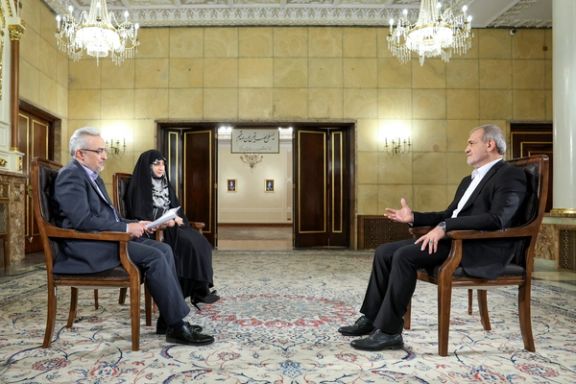Pezeshkian sidesteps major foreign policy issues in interview

In his first televised interview as President, Masoud Pezeshkian attempted to maintain the persona of a relatively candid politician but carefully sidestepped major issues and questions.

In his first televised interview as President, Masoud Pezeshkian attempted to maintain the persona of a relatively candid politician but carefully sidestepped major issues and questions.
Pezeshkian made only brief mention of the Islamic Republic’s foreign policy, including its significant dispute with the West over its nuclear program—a conflict that has positioned Iran as a nuclear threshold power but has also impoverished the nation economically. The president merely acknowledged, in a single sentence, that the economic crisis was tied to both domestic and foreign factors.
Notably, Pezeshkian refrained from mentioning Israel, the United States, or the Middle East crisis, thereby avoiding the usual ideological rhetoric against "the enemies."
Five weeks into his presidency, Pezeshkian was somewhat candid in listing the symptoms of Iran's current challenges but stopped short of addressing the fundamental causes. He highlighted issues such as delayed payments to wheat farmers, energy shortages, environmental crises, and the underpayment of teachers and nurses—symptoms of the country’s deeper problems.
While he emphasized the need for national accord, Pezeshkian did not discuss the importance of media freedom or the release of political prisoners. He spoke of respecting diverse opinions but overlooked the harsh sentences handed out for even mild criticism of the clerical government.
Rouydad 24, a major reformist-leaning news website in Tehran, published a critical analysis of Pezeshkian’s interview, stating, "The president's first address to the public can hardly be described as a success in terms of appeal, though it wasn't a failure either. He candidly addressed some of the country's most pressing issues, focusing on justice, while skillfully avoiding topics related to problems surrounding the concept of freedom."
Pezeshkian also failed to mention the recent death of Mohammad Mir-Mousavi, an Iranian citizen who died from beatings while in police custody in Lahijan. He skirted around issues such as the hijab mandate and severe internet restrictions, insisting that such policy matters are under discussion and that experts will devise solutions. This led Rouydad 24 to conclude that the president’s remarks were "short on freedom."
On foreign policy, Pezeshkian largely avoided the topic, neglecting both its role as a primary cause of Iran’s economic woes and its reinforcement of the regime’s anti-Israel and anti-West rhetoric. Although Pezeshkian is scheduled to attend the UN General Assembly in New York later in September, he offered no hints about any specific diplomatic plans.
He did emphasize the importance of engaging the Iranian diaspora, who could potentially invest billions of dollars in the country, helping to alleviate the current fiscal crisis. However, he failed to address the regime’s policies that have driven millions of the most educated and financially capable Iranians out of the country.